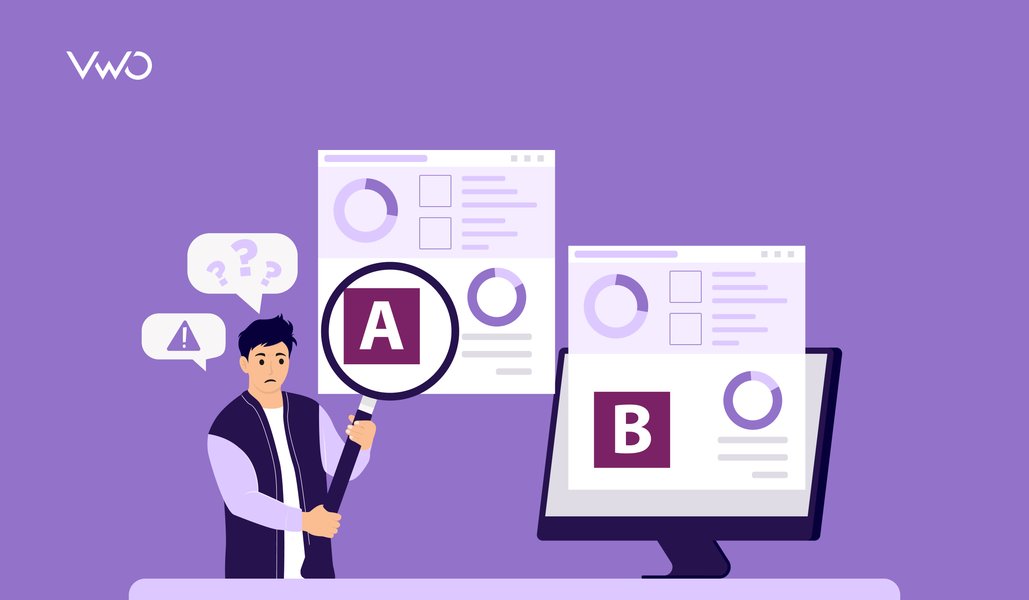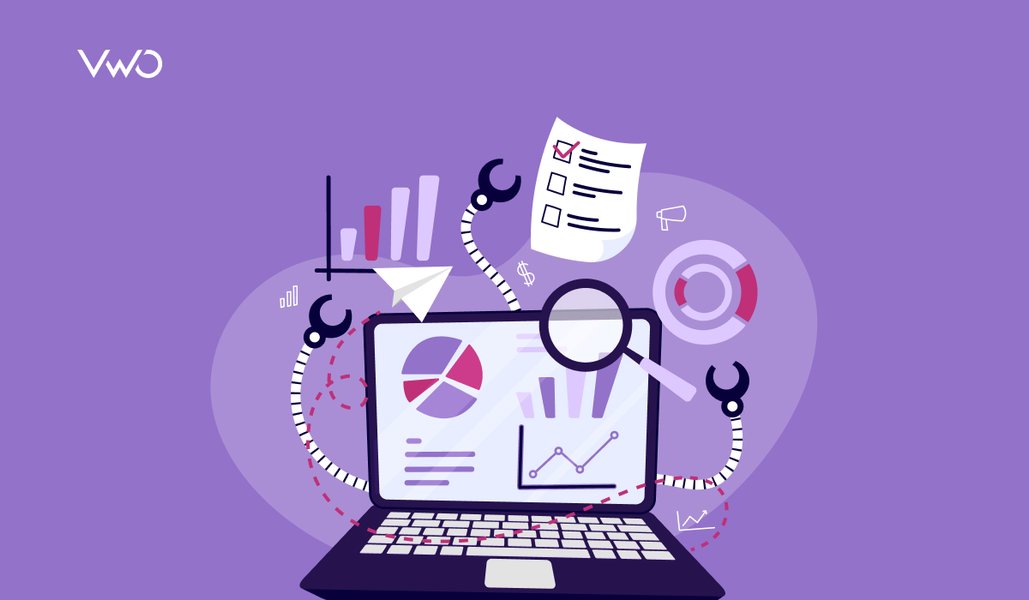Running an eCommerce business is no small feat. With endless metrics to track—sales, customer behavior, marketing performance—it’s easy to feel lost in the data.
Are your ads driving conversions? Which products are your top performers? Why are some visitors leaving without purchasing? Without the right insights, scaling your business can feel like an uphill battle.
This is where eCommerce analytics tools shine!
These tools transform raw data into actionable insights, helping you understand customer behavior, optimize marketing strategies, and identify growth opportunities.
By centralizing your data, they take the guesswork out of decision-making, so you can focus on what matters most: boosting conversions and growing your business.
In this article, we’ll dive into the best eCommerce analytics tools and how they can help you take your business to the next level. Let’s get started!

How can eCommerce analytics tools help your business?
The right ecommerce analytics tool helps you better understand your customers, streamline operations, and support growth. These tools deliver actionable insights that simplify decision-making and enhance overall business performance. Here’s what they can do for you:
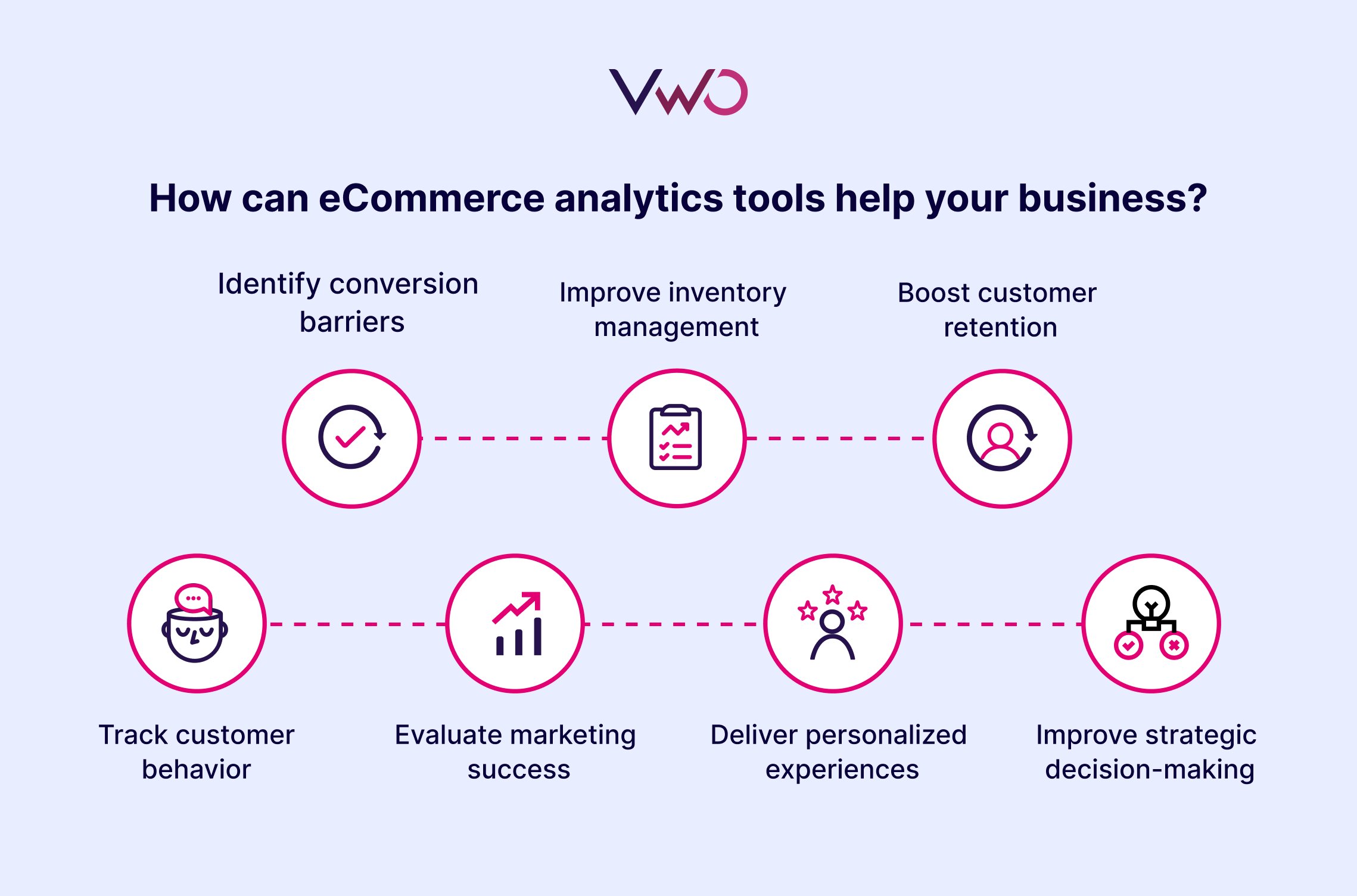
- Track customer behavior: Analyze site navigation, clicks, and drop-offs to optimize the user experience.
- Identify conversion barriers: Address issues like abandoned carts and slow pages to boost conversions.
- Evaluate marketing success: Measure campaign performance in real-time to align budgets on what works.
- Improve inventory management: Use data to stock best-sellers, reduce overstock, and balance inventory.
- Deliver personalized experiences: Customize recommendations and discounts to enhance customer satisfaction.
- Boost customer retention: Create loyalty programs and offers based on repeat customer data.
- Improve strategic decision-making: Leverage insights to refine strategies, predict trends, and stay competitive.
List of top eCommerce analytics tools – Quick glimpse
9 Best eCommerce analytics tools for every budget
eCommerce analytics tools – Summary
| Tool Name | Features | Pricing |
| VWO Insights | Heatmaps, Funnels, Session Recording, AI-powered Heatmap Generator and Surveys | Free trial: 30 days, inclusive of all features. Paid: Offers customized pricing plans according to your business requirements. |
| Google Analytics | Built-in Automation, Predictive Analytics, Real-Time Reporting, Funnel Analysis, Integrations, User Exploration using Segmentation, Monetization Reports | Free for all. |
| Kissmetrics | Funnel Analysis, Customer Behavior Tracking, AI Insights, Advanced BI Reporting | No free trial is available. A demo can be requested. Paid: Starts from $299/month, billed annually. |
| Matomo | Heatmaps, Session Recording, User Segmentation, Event & Content Tracking, Cohorts, Behavior Analytics, Funnels, Search Engine Keyword Performance | Free trial: 21 days available to try features. Free: For on-premise solutions. Paid: Starts from $26/month for cloud-based services. |
| Woopra | One-click Integrations, Behavioral Segmentation, Automation, Real-time Customer Tracking, Custom Metrics, Dynamic Journeys, User Journey Tracking, Data Retention | Free trial: 14 days for all paid plans. Free: Core plan for 10k actions/month. Paid: Starts from $49/month. |
| Supermetrics | Data Integration, Custom Data Import, Pre-built Data Sources, Data Management, Reporting & Visualization, Audience Segmentation, Insights | Free Trial: 14 days for any Supermetrics connector or destination. Paid: Starts from $29/month. |
| Glew.io | Deep Integrations, Data Pipeline, Data Warehouse, Data Cloud, Data-driven Insights, Commerce Intelligence, Automated Daily Snapshot, Custom Reports | Free trial: For the Glew Pro plan. Paid: Prices are not available on the website. |
| Metrilo | Filtering & Segmentation, Automated Emails, Growth Assistant, Product Management Reports, Conversion Funnels, Revenue Breakdowns, Cohort Comparisons, Marketing Performance Reporting | Free trial: 14 days for all features. Paid: Starts from $165/month, billed annually. |
| Geckoboard | Dashboard Creator, Integrations, Shareable Dashboards, KPI Notifications, Snapshorts and reports | Free trial: Available for all features. Paid: Starts from $44/month, billed annually. |
1. VWO Insights
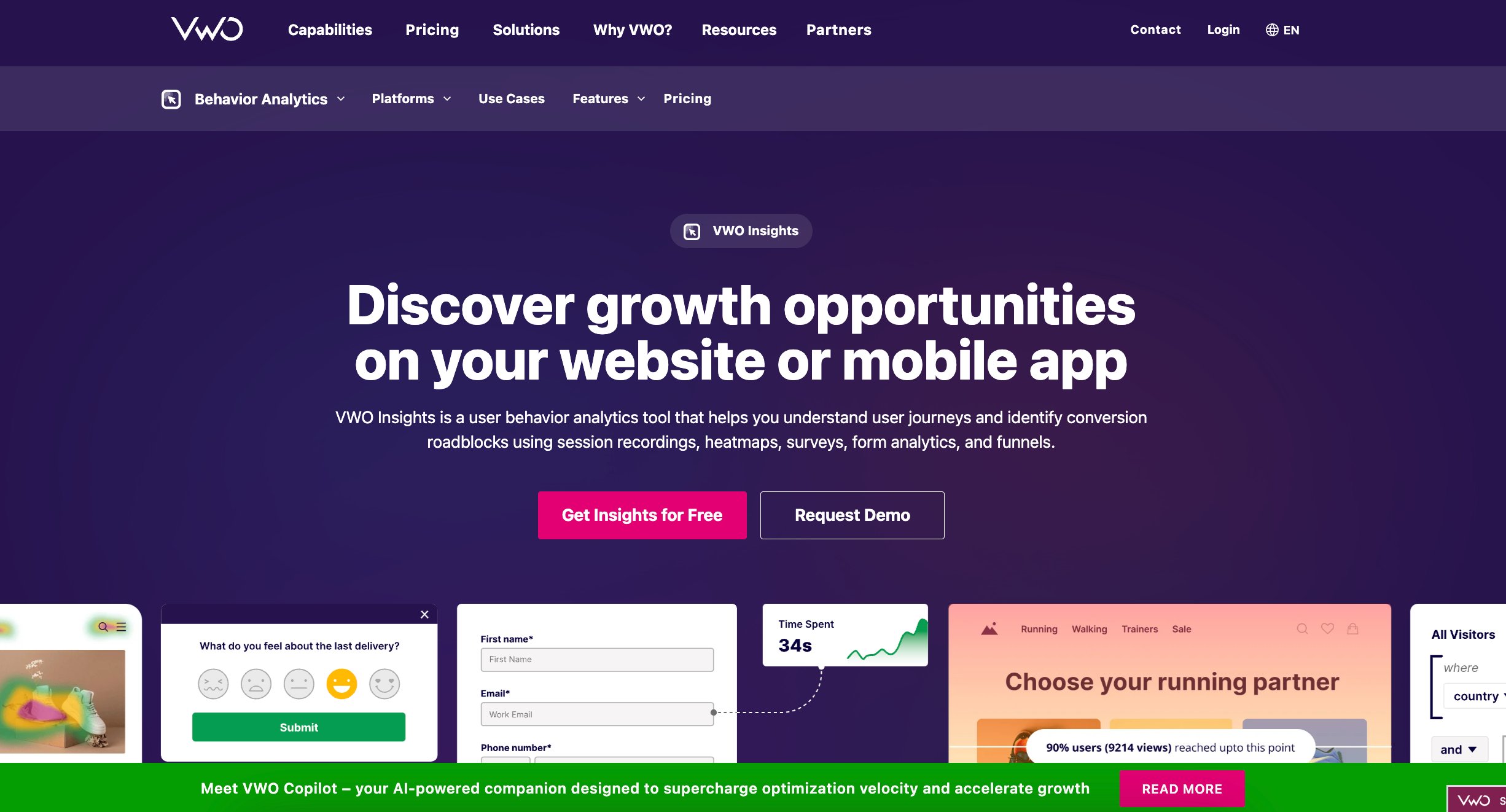
VWO Insights goes beyond traditional eCommerce analytics by offering advanced user behavior analytics to help businesses optimize their websites and mobile apps. Its robust features, including surveys, behavior analytics, and form optimization, provide a comprehensive approach to identifying conversion barriers and enhancing usability.
By pairing quantitative data with qualitative insights—such as customer feedback and session recordings—VWO Insights delivers a well-rounded view of customer behavior. This integrated approach uncovers the “what” and the “why” behind user actions, enabling businesses to improve experiences and boost conversions effectively.
Top features:
Heatmaps
Visualize user interactions like clicks, taps, and scrolls to understand engagement on your website or app. Live heatmaps let you analyze interactions with dynamic elements like modals or popups. Access, download, or share heatmaps with auto-attached observations for seamless collaboration and feedback.
Use VWO Copilot to automate heatmap and session recording analysis, uncover actionable insights on user behavior, and apply recommended optimizations to boost visitor engagement.
Session Recordings
Gain insights into user struggles on your website or app with session recordings. Filter and analyze specific sessions to identify friction points like rage clicks or drop-offs, helping you optimize the user experience and resolve issues effectively.
Surveys
On-page surveys reveal the “why” behind user behavior by collecting feedback directly from website visitors. Real-time targeted pop-up surveys can be customized for specific pages or user segments, uncovering motivations and hesitations. AI-generated questions, multilingual support, contextual triggers, and dynamic logic ensure actionable insights with precision.
Form Analytics
Optimize lead forms with detailed analytics that track skipped, refilled, or abandoned fields and time spent on each field. Conversion funnels and time-based metrics monitor form trends, helping businesses address drop-offs and improve completion rates.
Funnels
Track user journeys step-by-step, analyzing interactions like clicks and form submissions to identify drop-offs. Insights from heatmaps and session recordings highlight friction points, enabling businesses to streamline paths to conversion.
Segments
Analyze user behavior with advanced segmentation based on device, browser, traffic source, or interactions like drop-offs and rage clicks. Businesses can extract precise insights and drive targeted optimizations with customizable and reusable segments.
Dashboard overview:
The Insights Dashboard for websites centralizes visitor behavior data and assigns an experience score to highlight areas for improvement. It offers quick access to session recordings, heatmaps, and form and survey analytics summaries, simplifying the process of analyzing and optimizing the user experience.
Use the Experience Score in the Insights dashboard to track user behavior on a 0-100 scale and make informed decisions on layouts, placements, and features.
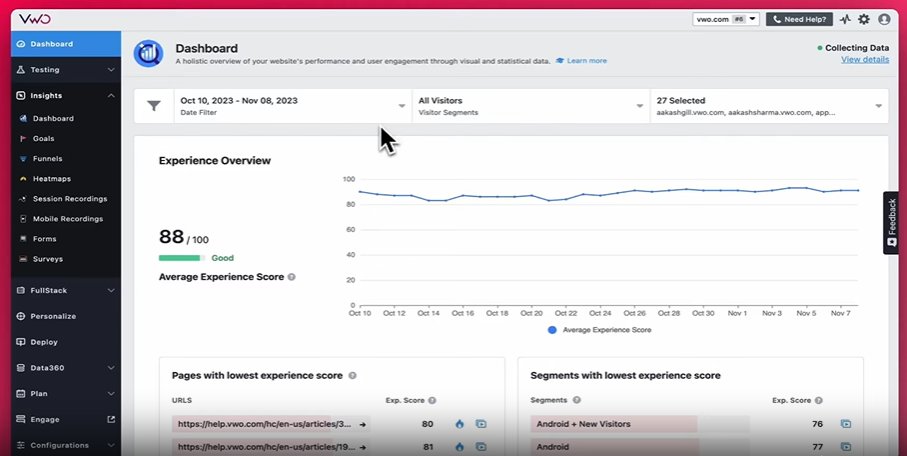
Features:
AI-powered Heatmap Generator and Surveys, Behavior Analytics, Customer Data Platform, Code Editor, Enhanced SmartStats, and Advanced Targeting
Pricing:
- Free trial: 30 days, inclusive of all features.
- Paid: Offers customized pricing plans according to your business requirements.
Customer experience:
“It is very nice to have everything, from analysis to testing, in one tool. This also makes it easier to do analysis on specific variants or experiments. The Form Analytics have been the most useful feature for me lately, due to the way we could unveil very specific frustration points and opportunities on one of our most important pages. The suggestions made by VWO to watch recordings or view heatmaps in certain scenarios are also a nice addition.”
– Donny van der Molen,
CRO specialist at Vandebron
Source: VWO Success Stories
2. Google Analytics
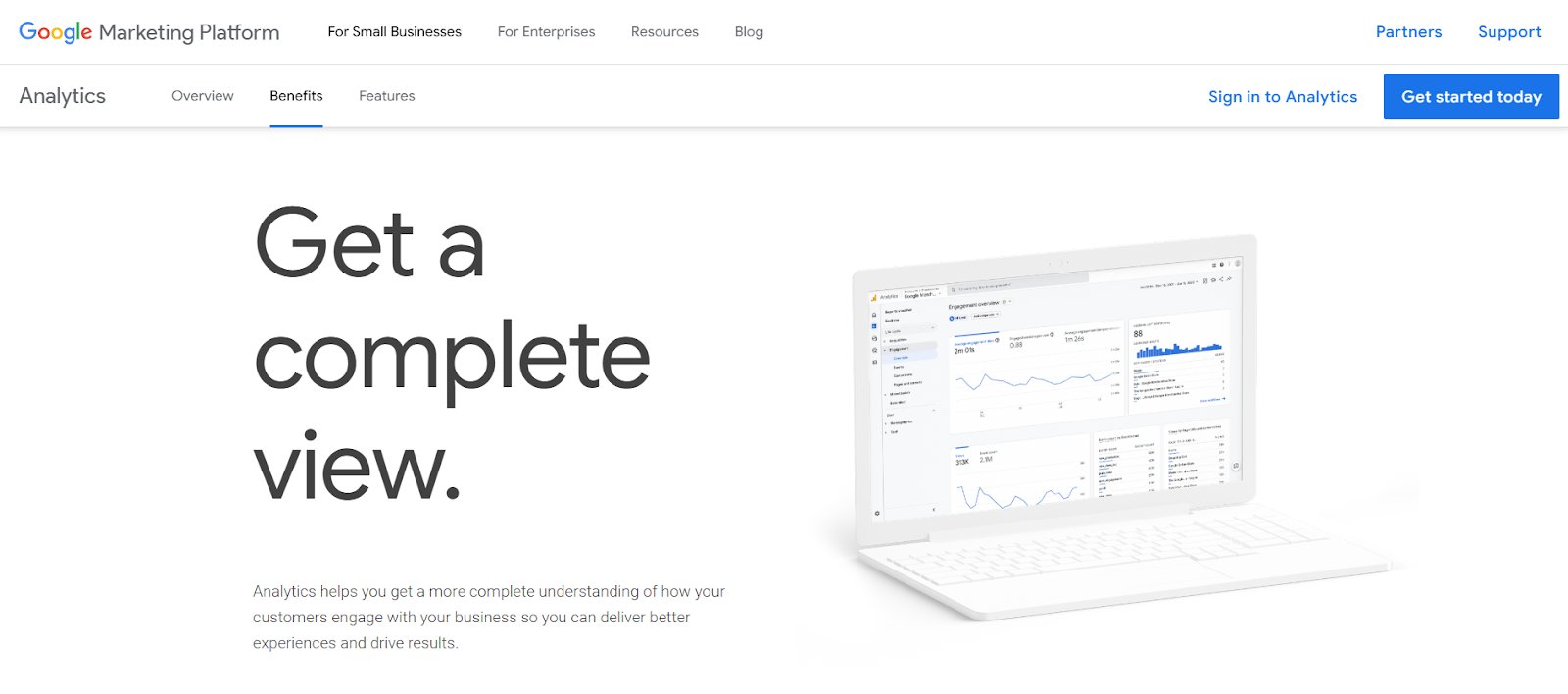
Google Analytics (GA) is the most popular analytics tool for website owners to analyze traffic and understand visitor interactions. While it tracks key website metrics like pageviews and session duration, it doesn’t automatically track eCommerce data such as product performance, revenue, or conversion rates.
To unlock these insights, you must enable eCommerce tracking by setting up eCommerce events that log customer activities, such as adding items to the cart or completing a purchase, providing insights into customer preferences, marketing effectiveness, and opportunities to boost sales and engagement.
Dashboard overview:
Google Analytics Dashboards provide an at-a-glance overview of essential metrics and reports, allowing you to track performance and uncover insights effortlessly. With customizable display options like numeric metrics, tables, and charts, dashboards are easy to create, share, and export for streamlined collaboration and analysis.
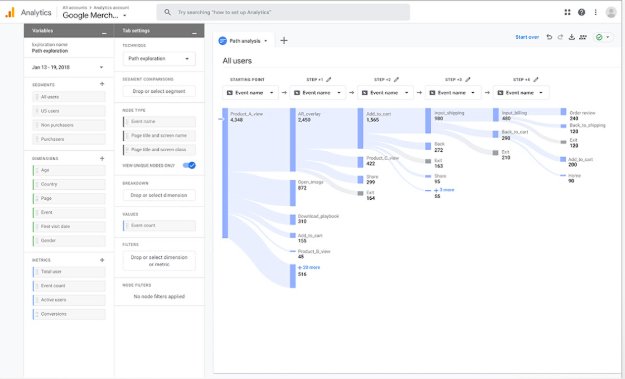
Features:
Built-in Automation, Predictive Analytics, Real-Time Reporting, Funnel Analysis, Integrations, User Exploration using Segmentation, Monetization Reports
Pricing:
- Google Analytics is free for all
Customer experience as per G2:
“What I appreciate most about Google Analytics is how clearly it reveals user behavior on a website. It offers both real-time and historical insights into traffic sources, user journeys, conversions, and drop-offs. This makes it easier to identify what is effective and what areas need improvement.” – Prashant Sharma, Marketing Manager at Excelra
3. Kissmetrics
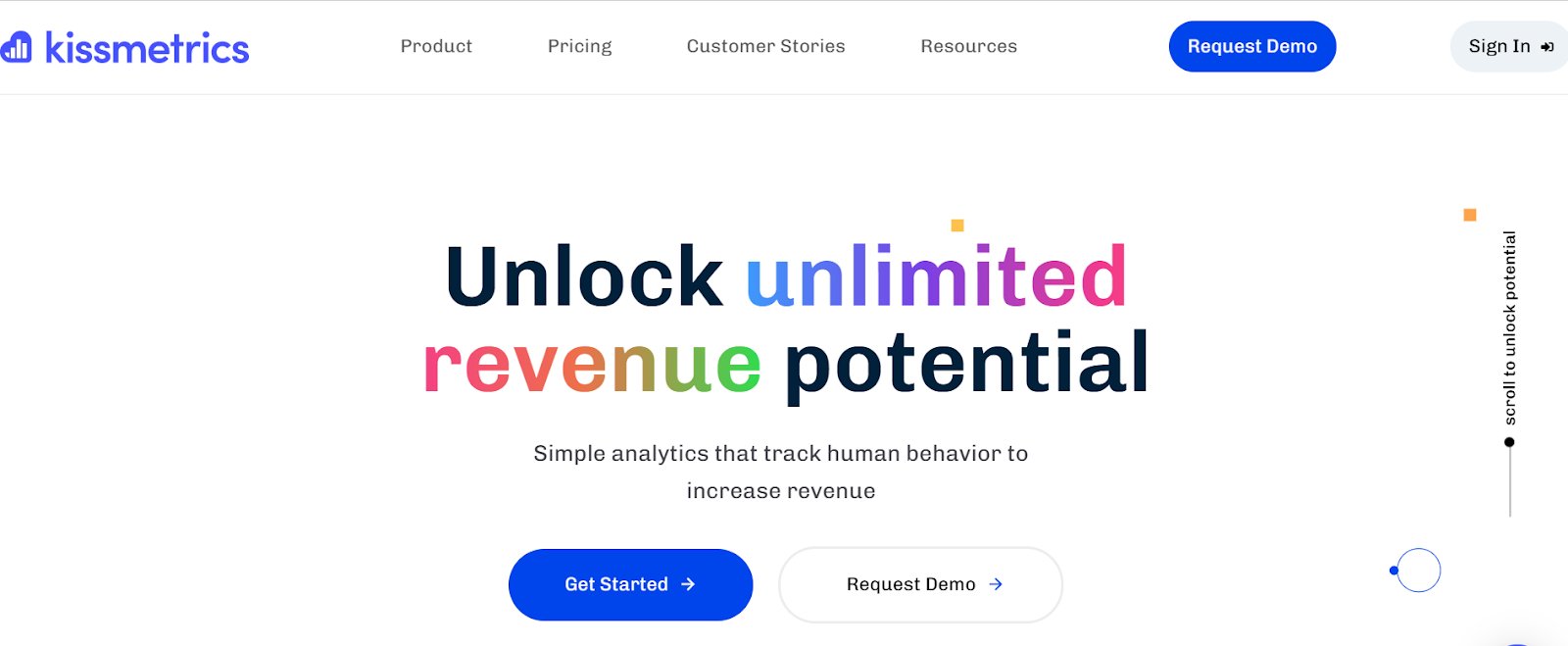
Kissmetrics is a web analytics tool designed to help store owners track and analyze customer behavior at every stage of the journey. Unlike tools focusing solely on site visits, Kissmetrics zeroes in on the users who actively engage with your product pages, providing deeper insights into meaningful customer actions.
Kissmetrics helps identify top-performing campaigns, analyze drop-offs, and uncover traits of successful customers while providing insights into sales, revenue, lifetime value, conversion rates, and cart-to-purchase performance.
Dashboard overview:
The Kissmetrics dashboard offers a clear, person-centric view of your customer journey, tracking behaviors and delivering powerful insights. It provides a range of detailed reports, including Funnel, Activity, Cohort, Revenue, and A/B Testing, to help you make data-driven decisions.
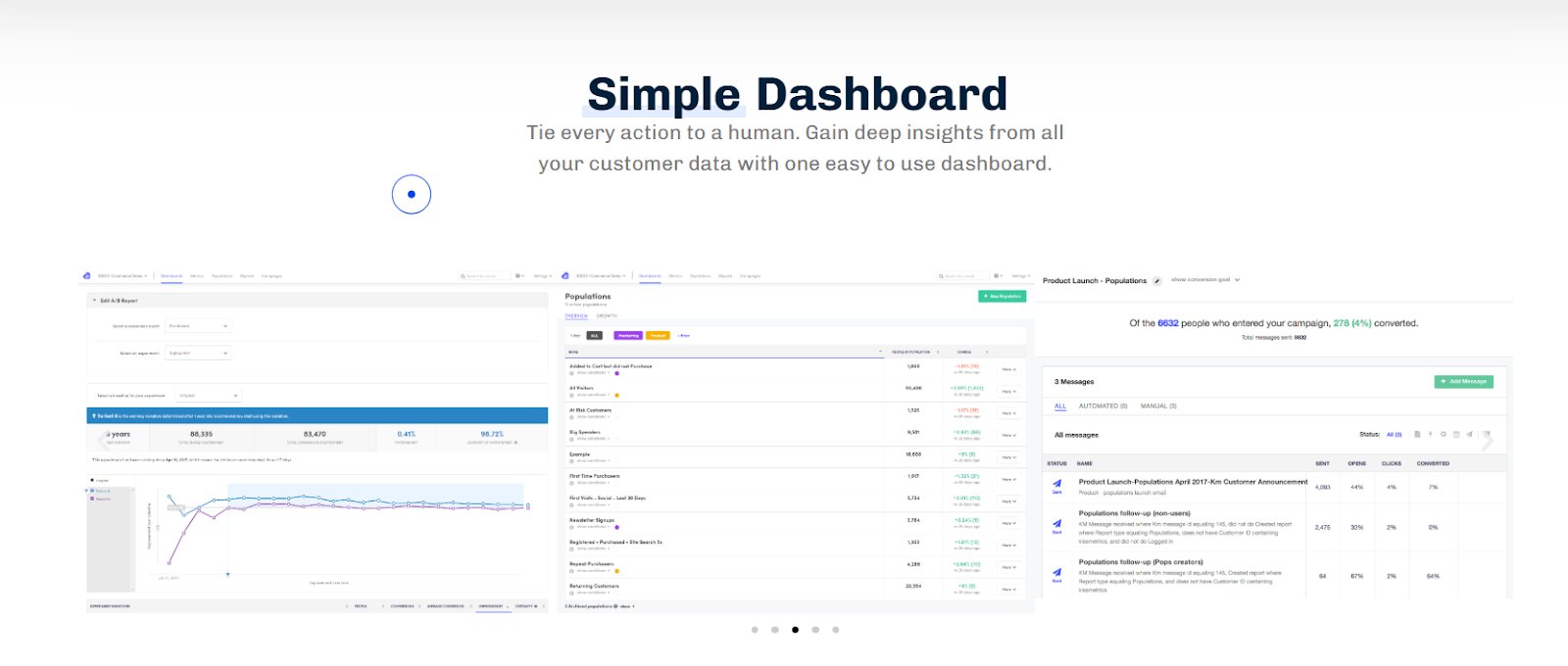
Features:
Funnel Analysis, Customer Behavior Tracking, AI Insights, Advanced BI Reporting
Pricing:
- No free trial is available.
- A demo can be requested.
- Paid: Starts from $299/month, billed annually.
Customer experience as per G2:
“It is a tracking and analytics tool that is well-regarded in my organization; it enables us to understand how users engage with our products and services.” – Brian Evans, Senior Human Resources Generalist at DAS42
4. Matomo
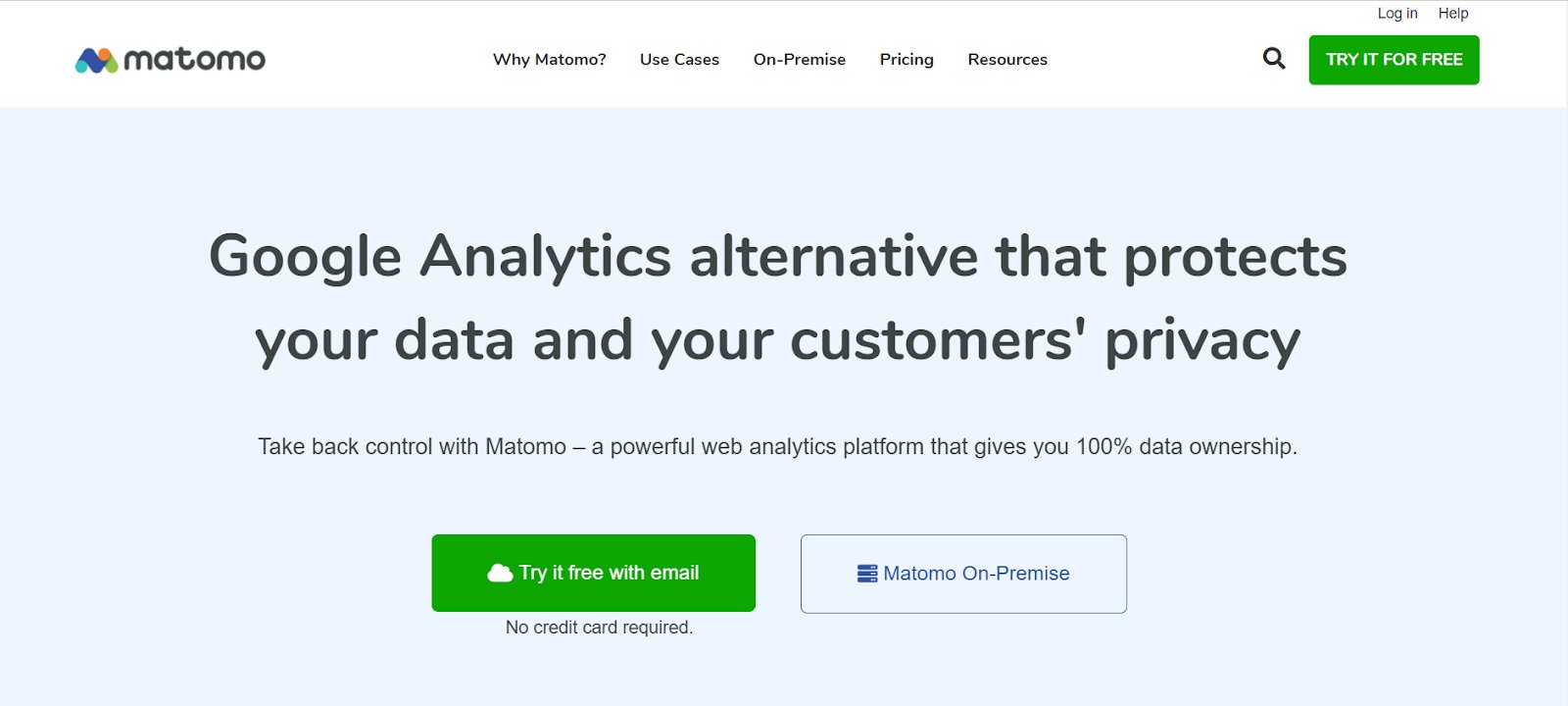
Matomo, formerly Piwik, is an open-source web analytics tool offering cloud and on-premise hosting options. Its eCommerce tracking goes beyond revenue metrics, providing detailed insights into customer behavior, website actions, and traffic sources that lead to sales.
Matomo seamlessly integrates with platforms like WooCommerce and Shopify, allowing businesses to optimize their websites, catch issues, and attribute sales value to every visitor for smarter, profit-driven decisions.
Dashboard overview:
Matomo dashboards provide a customizable, all-in-one view of your analytics, allowing you to tailor insights to your specific goals and user needs. Whether you need a high-level business strategy overview or detailed metrics for a marketing campaign, the dashboards are designed to adapt.
It also supports tracking unlimited websites, domains, and subdomains, making it a powerful tool for comprehensive analytics management.
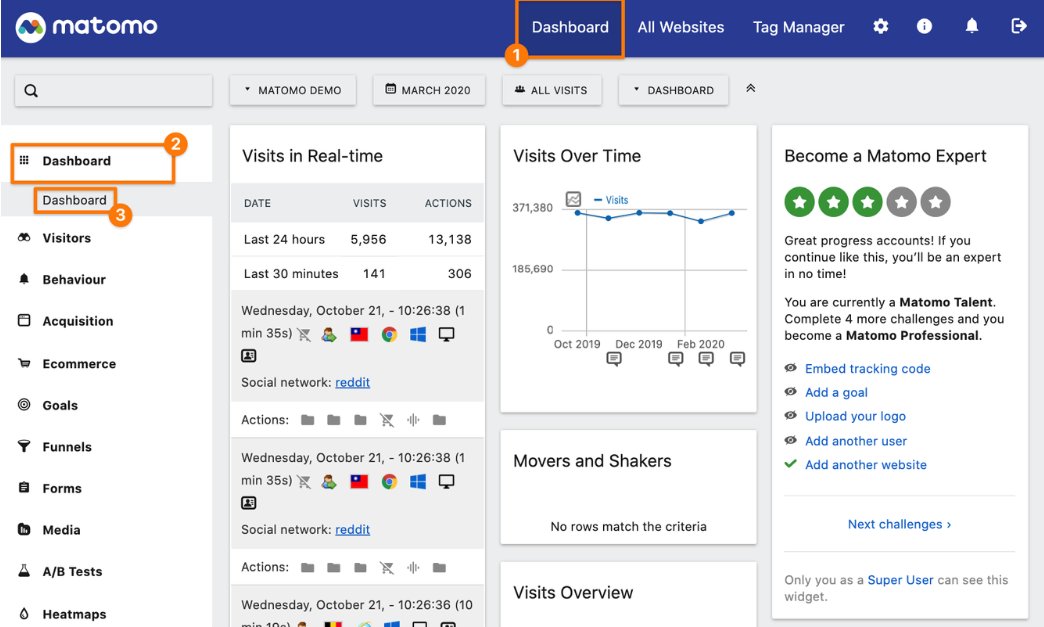
Features:
Heatmaps, Session Recording, User Segmentation, Event & Content Tracking, Cohorts, Behavior Analytics, Funnels, Search Engine Keyword Performance
Pricing:
- Free trial: 21 days available to try features.
- Free: For on-premise solutions.
- Paid: Starts from $26/month for cloud-based services.
Customer experience as per G2:
“Being open source provides a significant advantage over choosing a proprietary on-premises solution. You won’t have to worry about GDPR compliance since you will manage all aspects of analytics data gathering.” – Giovanni S., Sales Project Manager at Sun Rock Inc
5. Woopra
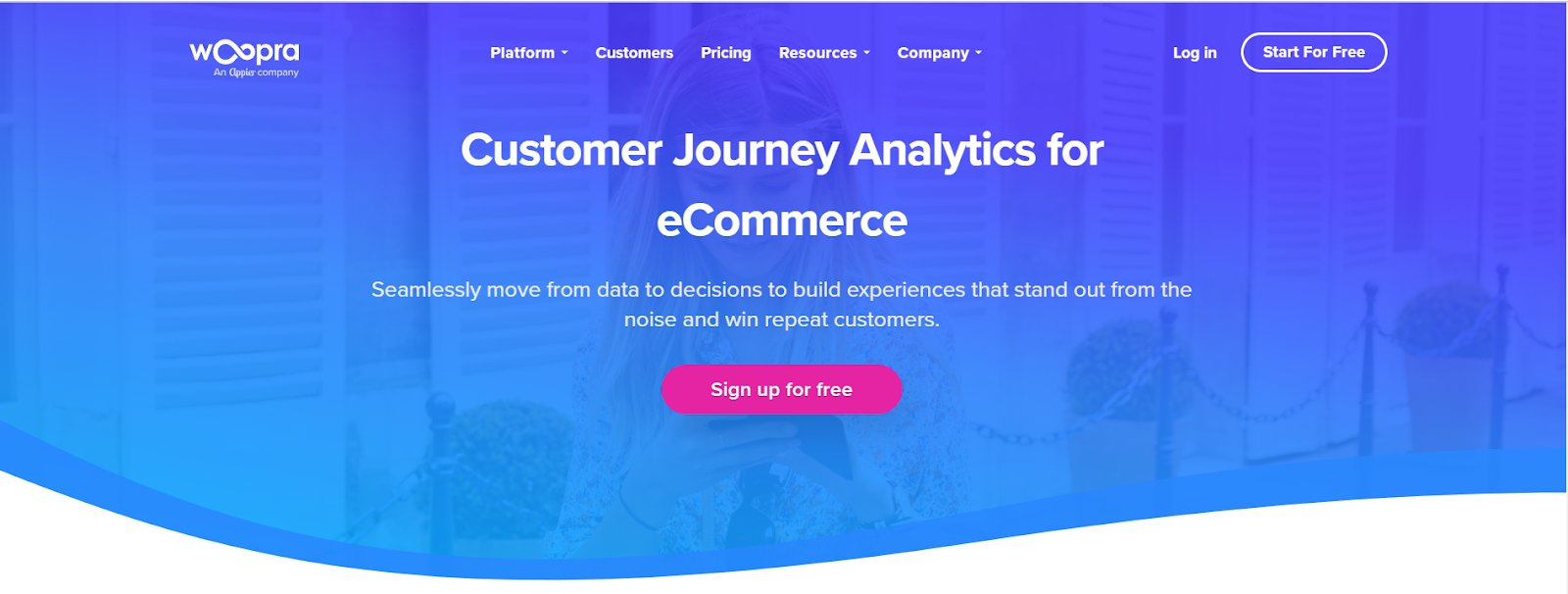
Woopra is an all-in-one customer journey analytics platform that helps eCommerce businesses optimize customer experiences. With its proprietary tracking system, Woopra offers a unified, real-time view of customer interactions, enabling companies to map complete user journeys and analyze key metrics like retention and engagement.
It enables the creation of individual customer profiles that capture detailed behavioral data, allowing for personalized insights and tailored strategies to drive growth and improve conversions.
Dashboard overview:
Woopra’s dashboard offers a range of reports to analyze user behavior and performance. It includes Customer Journey Reports for tracking visitor interactions at each stage, Metric Trend Reports to visualize key trends over time, Cohort Reports to monitor growth within specific user groups, and Retention Reports to assess long-term visitor engagement.
The dashboard equips businesses with insights required to enhance engagement and optimize strategies.
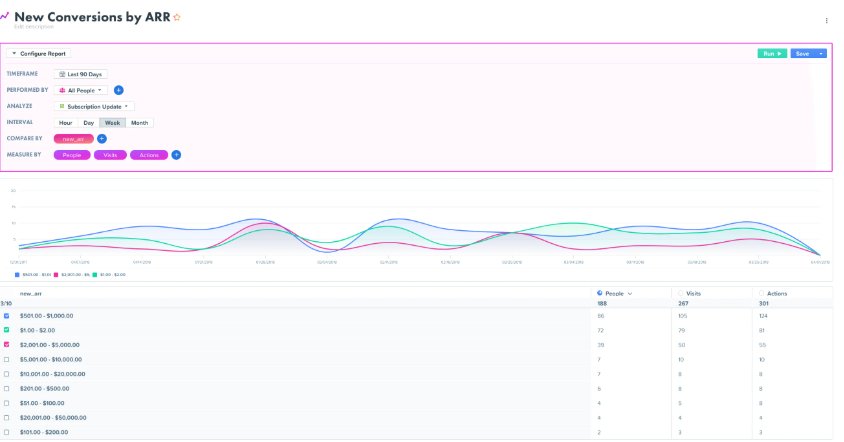
Features:
One-click Integrations, Behavioral Segmentation, Automation, Real-time Customer Tracking, Custom Metrics, Dynamic Journeys, User Journey Tracking, Data Retention
Pricing:
- Free trial: 14 days for all paid plans.
- Free: Core plan for 10k actions/month.
- Paid: Starts from $49/month.
Customer experience based on G2:
“Our company utilizes Woopra on a daily basis to gather unique insights that we can’t obtain elsewhere. We can create custom journey reports that show which pages users interacted with, alongside user attributes that are combined from Stripe, BigQuery, and several other sources.” – Andrew Kerr, Owner & Operator at Catalyst Designs
6. Supermetrics
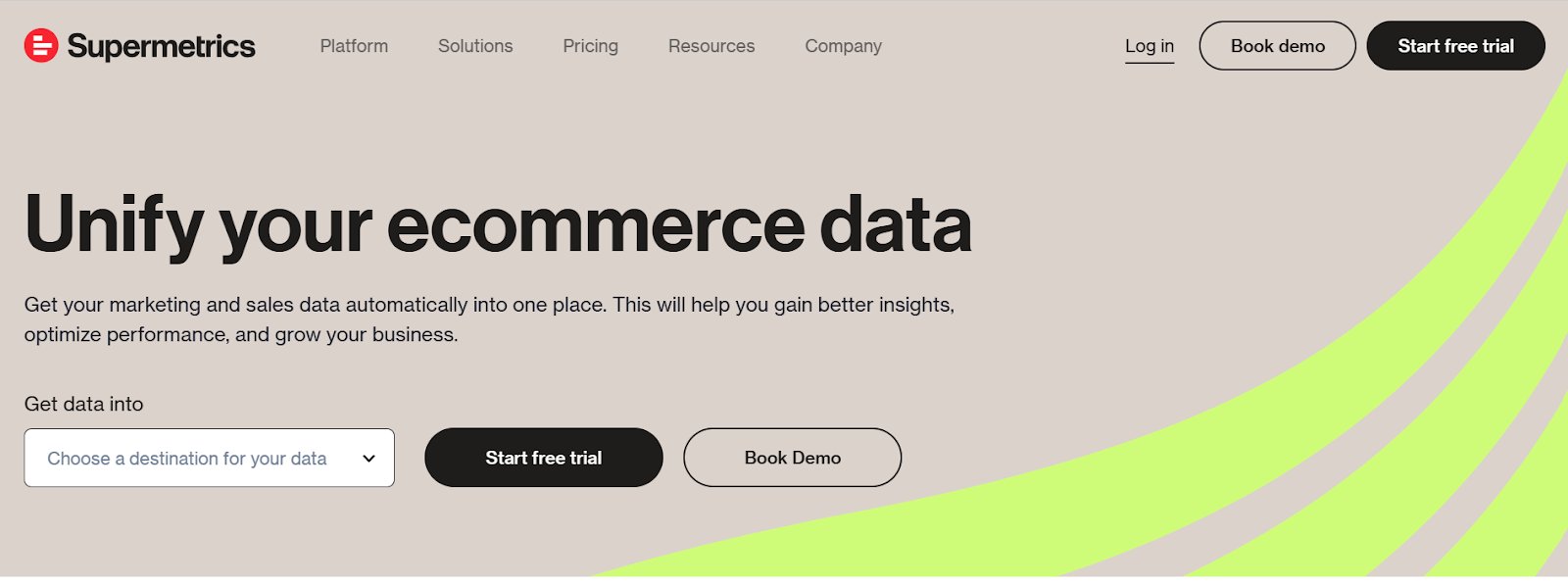
Supermetrics is a leading Marketing Intelligence Platform that connects data from multiple sources into one place, enabling seamless management, analysis, and activation. Its no-code tools for customizing and enriching data and integration with platforms like Looker Studio, Power BI, and Google Sheets simplify reporting and visualization.
Supermetrics enables businesses to optimize campaigns, personalize customer experiences, and drive growth with data-driven strategies while helping analyze historical data, forecast demand, and optimize stock for peak season success.
Dashboard overview:
Supermetrics offers multiple eCommerce dashboard templates that simplify tracking key metrics for online stores. By integrating web analytics, paid media, and Shopify, these dashboards provide insights into conversions, revenue, sales performance, and ad efficiency.
They help answer essential questions, such as which channels drive the most conversions, which products generate the highest revenue, and how paid media costs and conversion rates evolve, empowering data-driven decisions.
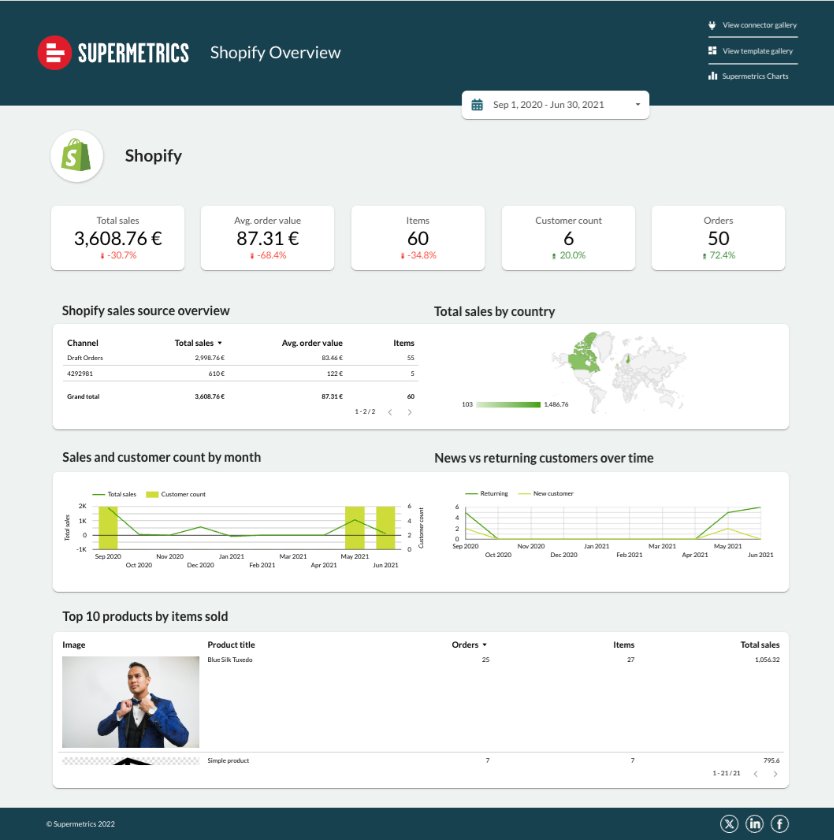
Features:
Data Integration, Custom Data Import, Pre-built Data Sources, Data Management, Reporting & Visualization, Audience Segmentation, Insights
Pricing:
- Free Trial: 14 days for any Supermetrics connector or destination.
- Paid: Starts from $29/month.
Customer experience as per G2:
“What I appreciate most about Supermetrics is its user-friendly interface, which enables us to create reports and analyze all of our clients’ digital properties without any hassle. Furthermore, the technical support is outstanding and always available to address any specific technical questions that may arise.” – Carlos María Meira, CEO & Founder at Meira Productivity
7. Glew.io

Glew offers a powerful eCommerce analytics solution for eCommerce professionals. It provides deep insights into customer behavior, segment performance, and product metrics. With real-time reporting, eCommerce metrics, and customer cohort analysis, Glew enables data-driven decisions to boost profitability.
Integrating seamlessly with Google Analytics, Shopify, and over 170 applications, Glew helps optimize ad spend, manage inventory, and personalize the shopping experience to enhance your eCommerce strategy.
Dashboard overview:
Glew’s multichannel dashboards unify your data from eCommerce platforms, advertising channels, web analytics, and more, providing a holistic view of your business. With hundreds of pre-built dashboards, you can instantly track KPIs for marketing, products, customers, inventory, and subscriptions.
The user-friendly and customizable dashboards offer tools for customer segmentation, product recommendations, and profitability analysis. Specialized features for subscription businesses help track recurring revenue and reduce churn, enabling smarter decisions to drive growth and retention.
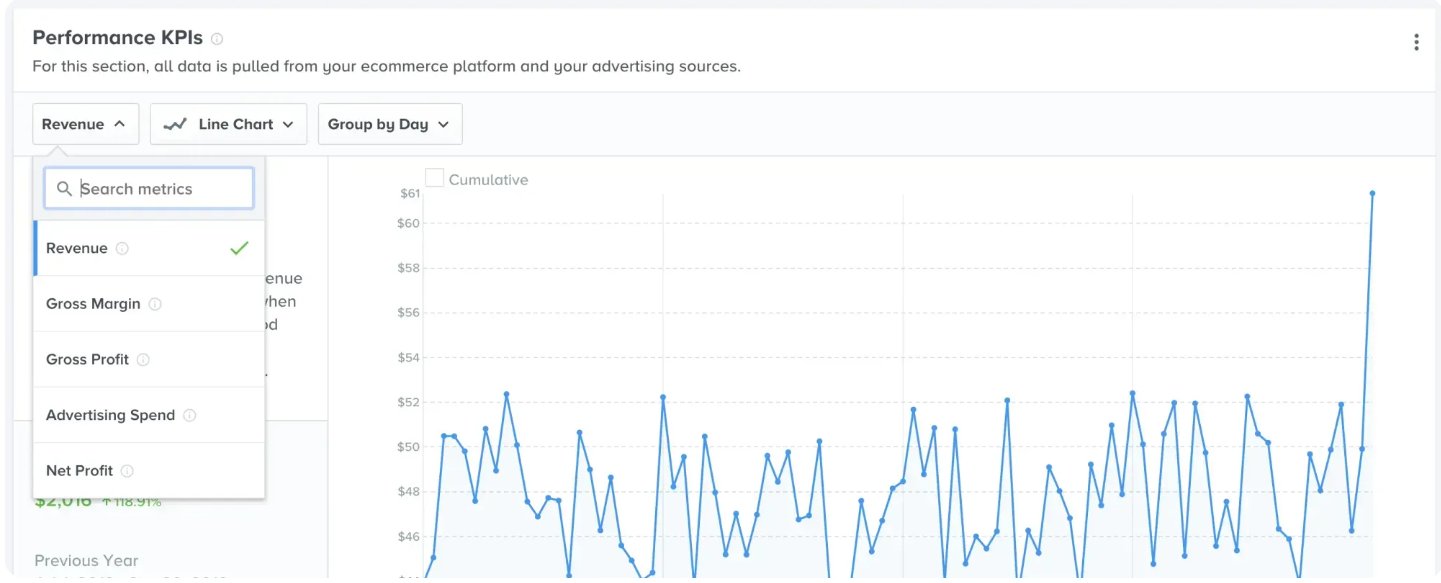
Features:
Deep Integrations, Data Pipeline, Data Warehouse, Data Cloud, No-code Platform, Data-driven Insights, Commerce Intelligence, Automated Daily Snapshot, Custom Reports
Pricing:
- Free trial: For the Glew Pro plan.
- Paid: Prices are not available on the website.
Customer experience as per G2:
“I prefer Glew because it enables reporting on sales, revenue, orders, and products sold, something that BigCommerce lacks. I appreciate its easy implementation and well-designed user interface, which simplifies the process of running reports and viewing data. This makes my job easier and allows me to focus on other areas of my work.” – Phil Slater, Ecommerce Director at ASC Direct
8. Metrilo
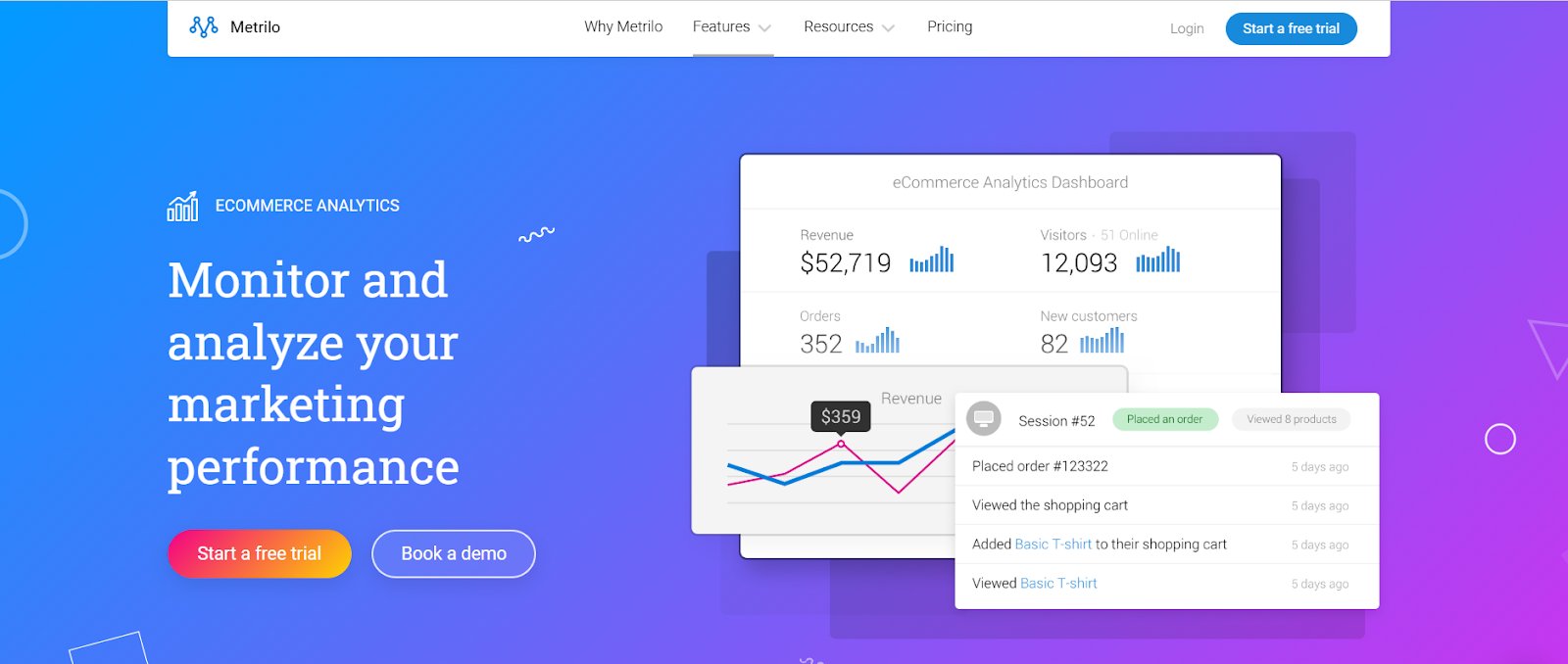
Metrilo helps digitally native brands compete with legacy players through advanced eCommerce analytics. It automatically reports on marketing performance, engagement metrics, and sales attribution, making tracking channels, referrals, and influencers easy while optimizing spending.
With pre-set funnels mapping the customer journey, Metrilo highlights friction points, enabling quick improvements to boost conversions and enhance the shopping experience. Simple yet powerful, it equips brands to grow profitably and stay ahead.
Dashboard overview:
Metrilo’s intuitive dashboard provides a comprehensive, real-time view of your online store’s performance, allowing you to track the most important metrics and make data-driven decisions to drive growth and profitability. Key metrics include:
- New customers: See how many first-time buyers you’ve acquired.
- Top-selling products: Identify your best-performing items to optimize inventory.
- Real-time revenue: Gain precise revenue attribution beyond Google Analytics.
- Successful orders: Monitor completed orders with processed payments.
- Conversion rates by device: Analyze customer preferences across devices.
- Customer lifetime value: Measure the average revenue generated by your customers.
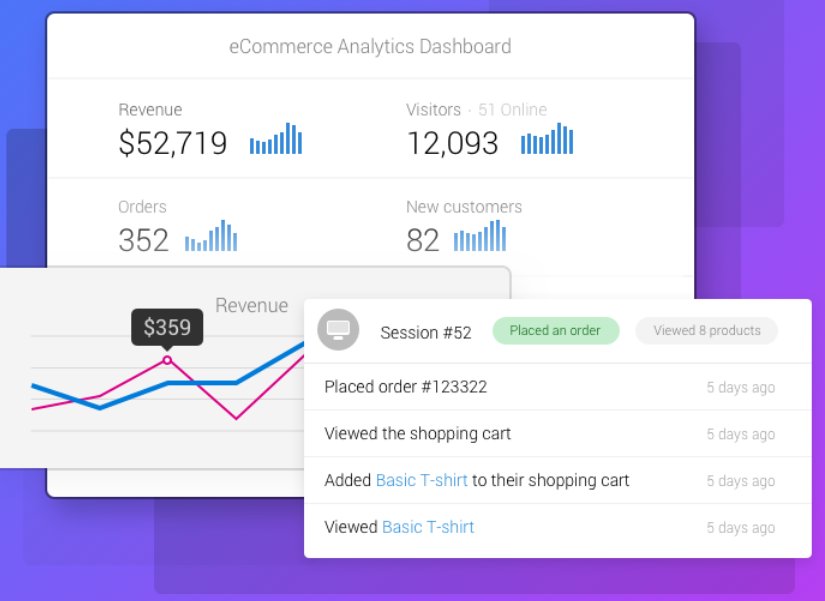
Features:
Filtering & Segmentation, Automated Emails, Growth Assistant, Product Management Reports, Conversion Funnels, Revenue Breakdowns, Cohort Comparisons, Marketing Performance Reporting
Pricing:
- Free trial: 14 days for all features.
- Paid: Starts from $165/month, billed annually.
Customer experience based on G2:
“Metrilo simplifies tracking, segmenting, and marketing to customers in smarter, more targeted ways.” – Dion Rodrigues, Director of Marketing at JR Toy Company Canada
9. Geckoboard
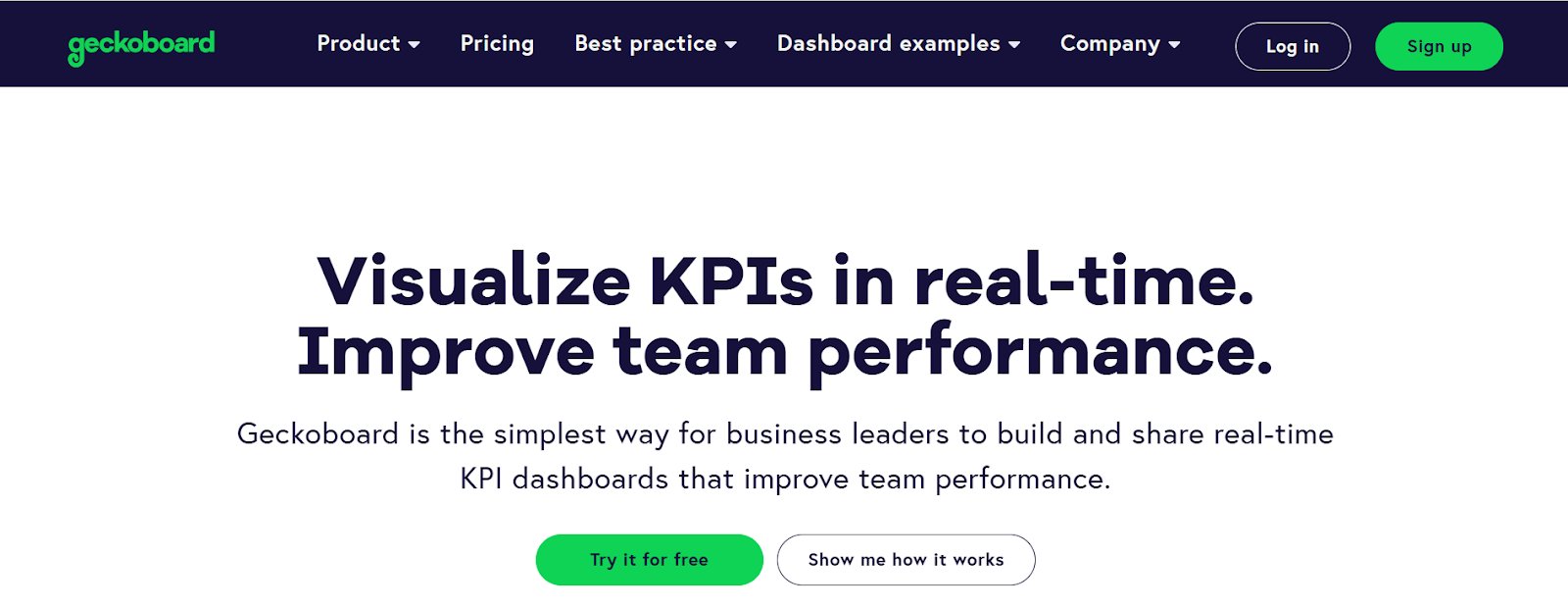
Geckoboard enables businesses to track eCommerce KPIs in real-time, helping teams monitor performance and respond quickly to issues like unfulfilled orders or fluctuating ad spend. With its user-friendly interface, you can build custom shareable dashboards in minutes by integrating data from Shopify, Google Ads, Klaviyo, and Google Analytics.
Geckoboard supports multiple Shopify stores and syncs with Slack for team updates, making it the simplest way to stay on top of your eCommerce performance.
Dashboard overview:
Geckoboard’s eCommerce dashboard consolidates key metrics from platforms like Shopify and Facebook Ads into a single, real-time view, saving time and enabling quick responses to changes. It offers multiple dashboards, including KPI, Shopify, eCommerce marketing, inventory, and warehouse dashboards.
With clear visualizations, an intuitive layout, and near real-time updates, it provides the most critical insights at a glance, keeping your data accessible and actionable.
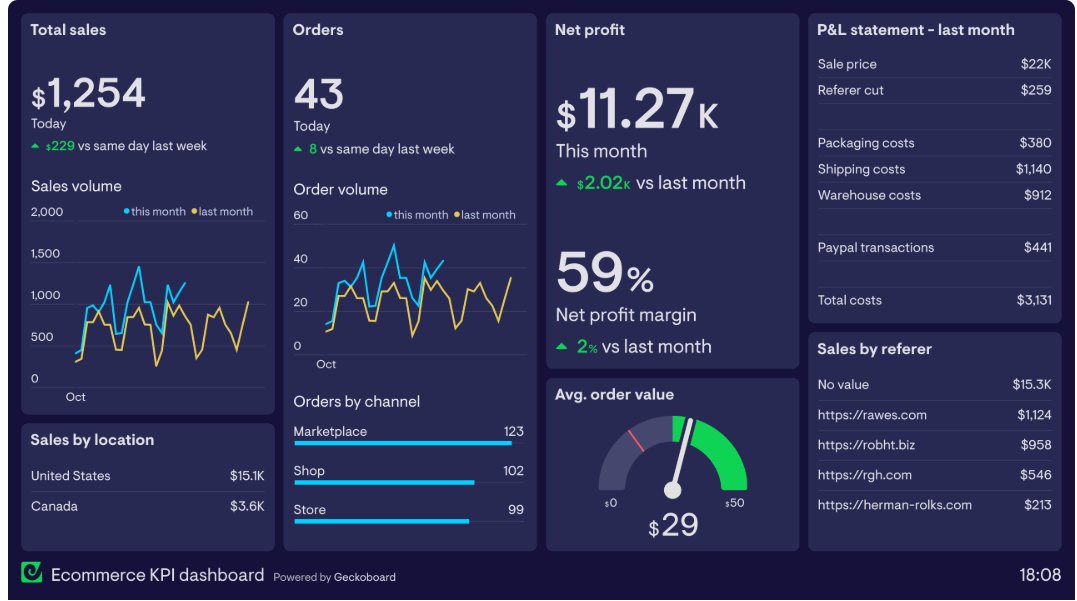
Features:
Dashboard Creator, Integrations, Shareable Dashboards, KPI Notifications, Snapshorts and reports
Pricing:
- Free trial: Available for all features.
- Paid: Starts from $44/month, billed annually.
Customer experience based on G2:
“This is the easiest dashboard solution I have ever used. It performs almost everything I needed, and I was able to set it up and launch in just a few minutes.” – Peter Lalonde, Founding Partner at Higage
Expand your eCommerce toolkit with these analytics tools
Below are a few more tools that offer extra support to refine your eCommerce strategy and decision-making.:
Top parameters to consider before you choose your next eCommerce analytics tool
When selecting an eCommerce analytics tool, evaluating features that align with your business needs is essential. Here’s a breakdown of must-have and nice-to-have parameters to help you make an informed decision.
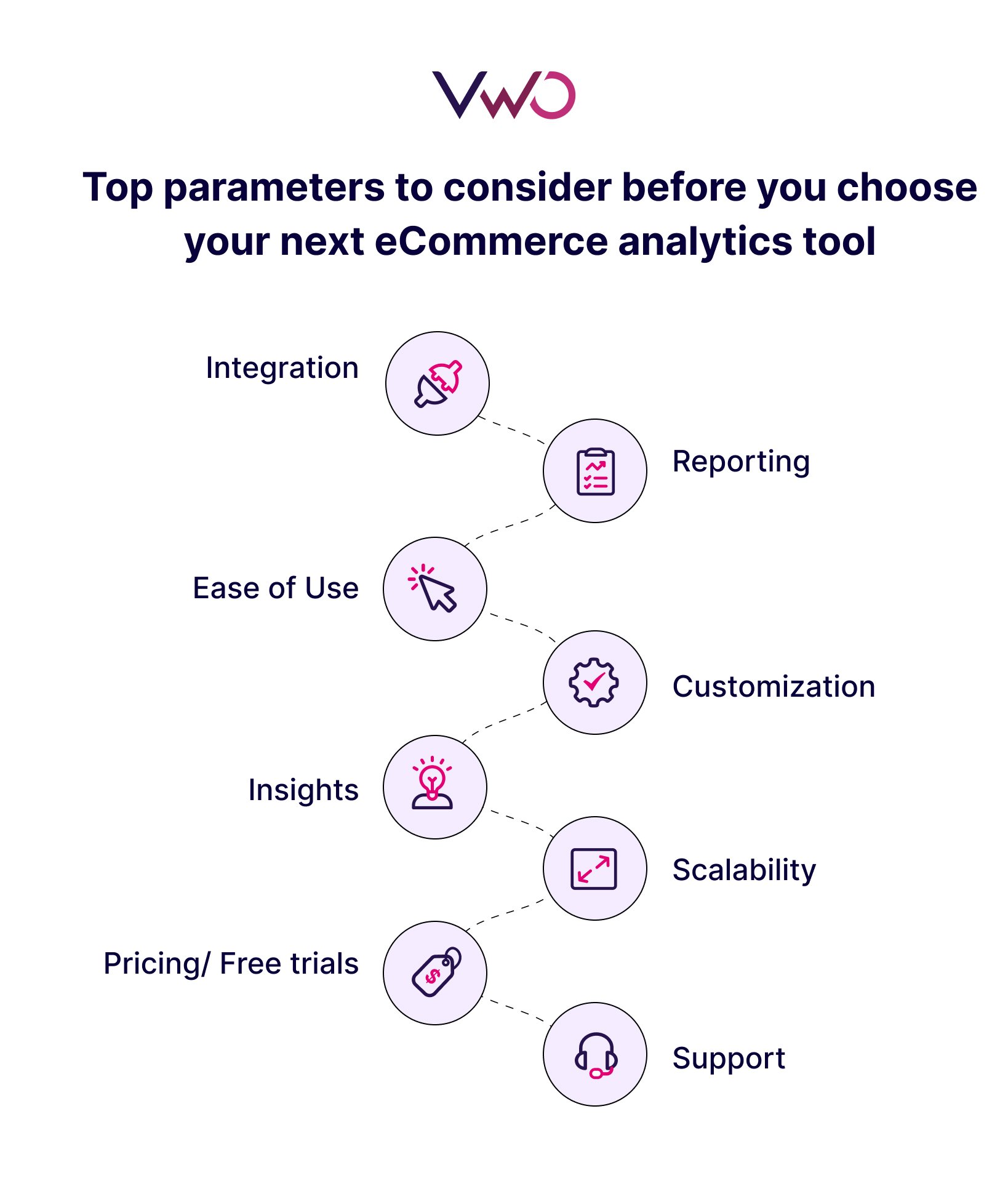
| Parameters | Must-Have | Why? | Nice-to-Have | Why? |
| Integration | Compatibility with Shopify, Google Analytics, etc. | Ensures seamless data flow from key platforms. | Integration with custom platforms | Supports unique platforms for advanced use cases. |
| Reporting | Real-time reporting | Tracks updates instantly to respond quickly to trends. | Predictive analytics | Forecasts future trends for proactive decision-making. |
| Ease of Use | Intuitive interface | Simplifies setup and daily usage for all team members. | AI-assistance | Automates data interpretation for advanced optimization. |
| Customization | Report and dashboard customization | Allows tailoring insights to your specific business needs. | Advanced personalization options | Offers granular customizations for niche business cases. |
| Insights | Conversion funnels, drop-off analysis | Identifies pain points in the user journey. | A/B testing capabilities | Enables testing variations for better optimization strategies. |
| Scalability | Can handle growing data needs | Adapts to your business as it expands and scales. | Support for multi-store tracking | Consolidates data across multiple stores for better oversight. |
| Pricing/ Free trials | Free trial or demo options | It lets you evaluate the tool before committing financially. | Tiered pricing based on features | It provides flexibility to scale as your needs grow. |
| Support | 24/7 customer support | Ensures timely help to resolve issues or queries. | Dedicated account manager | Offers personalized guidance for strategic implementations. |
Conclusion
eCommerce analytics tools are invaluable for addressing business challenges, from enhancing customer experiences to optimizing marketing efforts. The tools listed in this blog cater to various needs and budgets, helping you track metrics, segment audiences, and boost conversions. Use the insights from these tools to create a data-driven growth plan, set clear goals, and continuously evaluate your progress.
Don’t forget – success comes from consistent testing and optimization. Building an experimentation culture within your team will help you adapt and thrive.
For a powerful, all-in-one solution, consider VWO Insights. Start your free demo and transform your eCommerce strategy with data-driven decisions.
FAQs
eCommerce analytics tools help businesses track and analyze customer behavior, sales trends, marketing performance, and website activity. These insights empower businesses to optimize strategies, improve user experiences, and drive growth.
Analytics in eCommerce is used to understand customer behavior, monitor key metrics like conversion rates and average order value, optimize marketing campaigns, forecast demand, and personalize the shopping experience.
The best tool depends on your business needs. Popular options include Google Analytics for basic tracking, VWO Insights for behavioral analytics and A/B testing, and Matomo for privacy-focused insights.
eCommerce data is analyzed by tracking key performance indicators (KPIs) such as conversion rates, cart abandonment, traffic sources, and customer lifetime value. Tools like dashboards, heatmaps, and segment analysis help visualize data for actionable insights.
These tools collect and process data from multiple sources, like websites and marketing platforms, to provide insights into customer behavior, sales trends, and marketing performance.
Analytics tools are crucial for making data-driven decisions, optimizing marketing spend, improving user experiences, and identifying opportunities to boost sales and customer retention.



